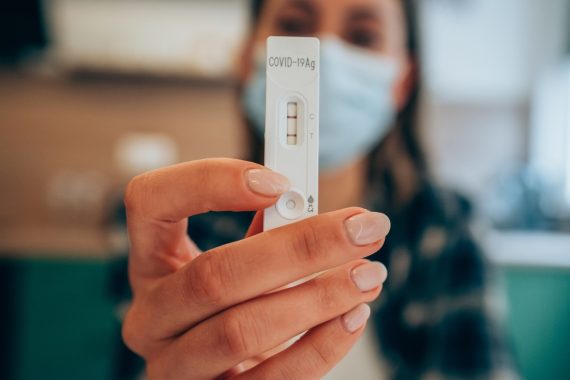Public did not understand need to report lateral flow test results in pandemic

The general public had not understood the importance of reporting lateral flow test results during the Covid-19 pandemic because the message was not well communicated, a report from the UK Health Security Agency has concluded.
Research showed people did not realise why reporting of results from universal testing was important for public health monitoring, particularly with negative tests.
It did not become the norm to report test results through the Government portal when other public health measures like regular self-testing had become commonplace.
In future pandemics, it would be vital to explain the reasons why people needed to report all test results, even negative ones, from the start when the public is most engaged in the messaging, the report found.
There should also be a clear, personally motivating reason to report, such as to link reporting of a result to the access of public spaces, the research which included focus groups found.
But the burden on people must be minimal, for example being able to report results through an app, UKHSA recommended.
From April 2021 to March 2022 of the pandemic, everyone had access to free lateral flow tests.
The number of self-tests did decrease over time with a desire among the public to return to normality.
Key drivers for continuing to test were as a means to visit a social space or take part in other day-to-day activities or to visit someone considered vulnerable, such as elderly relatives.
But the lack of reporting even when people were testing meant that the UK government was less able to effectively track the spread of the virus among the public, the report said.
A systematic review published by UKHSA at the same time also found that there were high levels of acceptability for self-sampling or at home testing and preferrable to being tested by professionals.
Richard Amlôt, deputy director of behavioural science and insights at UKHSA, said: ‘This research found that there were several barriers that prevented some people from reporting their self-test results, including a lack of understanding about why this step was important and limited awareness of the requirement.
‘The public did not always see reporting test results as an important or necessary part of the testing journey, and this should be considered for future pandemics.
‘The report makes a number of recommendations for improving how we communicate about the need to report self-test results.
‘By better understanding these barriers and identifying practical solutions for future scenarios, we can ensure that the lessons learned from Covid-19 strengthen our response capabilities going forward.’
Portfolio careers
What is the right portfolio career for you?

Visit Pulse Reference for details on 140 symptoms, including easily searchable symptoms and categories, offering you a free platform to check symptoms and receive potential diagnoses during consultations.
Related Articles
READERS' COMMENTS [1]
Please note, only GPs are permitted to add comments to articles














The quote from UKHSA mentions that there were ‘several’ barriers, but only mentions two; giving th eimpression that the public were to blame for lack of reporting of LFD results, particularly negative ones.
This diverts attention away from the areas of UKHSA responsibility, particularly the fact that the reporting website would not accept results, specific messaging that negative ‘routine’ LFDs should NOT be reported (as opposed to post-positive-day-5-plus negative results) however, even the latter were being actively discouraged by the systems in use.
user-friendliness of the reporting system was severely lacking.
It is not surprising that people preferred to self-sample, despite the horrendously low sensitivity rate for one-off routine self-testing of only about 6%, because it was being made extremely difficult to get a professionally-taken PCR swab test done, and only at considerable distances from patients’ homes!
All in all, there are a lot of lessons that UKHSA and government should have learned. I cannot say all the citizens were 100% conscientious, but most of them definitely were far more so than many high-profile Government figures, who wanted the public to forget about the pandemic and get back to work, because the auhtorities had failed in their duty to protect the population and wanted to sweep this under the carpet.